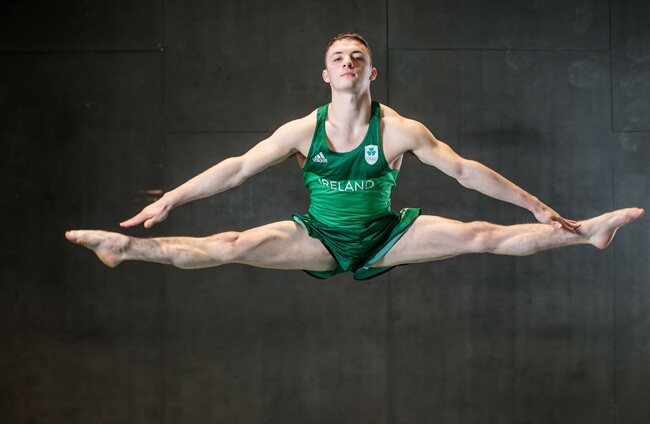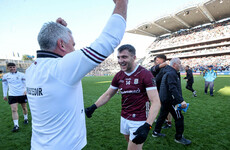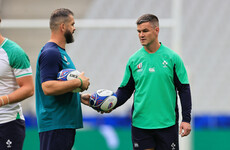HE WAS AT the top of the aisle, staring into his fiancée’s eyes, saying his vows. For better, for worse, for richer, for poorer. At that point someone should have approached the altar with an editor’s pen.
“For richer? You can scrub that line out, Father. This man is a full-time race walker.”
He’s also a full-time dreamer, a world class athlete who finished sixth in last year’s world championships. For the last eight years, Brendan Boyce has scrimped and saved, ‘always looking for the cheapest room to rent in the city, never eating out, living a meagre lifestyle’.
Getting a job to change that lifestyle and supplement his €12,000-per-year grant never entered the equation. “For me, I had to commit 100 per cent to this (50km race walking) because if I was going to be distracted by a career, I wasn’t going to be true to the six-year-old kid who dreamed of being the best athlete in the world,” Boyce says. “I was willing to give everything up to just do one thing perfectly.”
For so many, the Olympics are perfection. It’s The Show as well as the ideal; the purity of competition transported from Greek mythology into a modern setting. Yet, we’re lying to ourselves if we ignored everything else that surrounds it, the political opportunism, the stink of drug-taking.
We are perfectly entitled to question certain things, allowed to be cynical.
And yet we are also allowed to invest our trust in others. Here are four stories you can believe in.
**
On the night Rhys McClenaghan qualified for the Olympics there were tears. “It was a crazy feeling,” the 20-year-old gymnast says. “I called my mum (Tracey) up; it was almost like a near-death experience.”
McClenaghan was just after winning world championship bronze in the pommel horse event, the third major medal of his young career, up there, status wise, with the gold medals he won at the European championships and Commonwealth Games in 2018.
After the event had ended he was alone in his hotel room, “pressing refresh on my laptop, time after time after time, waiting, waiting, waiting. Eventually the final scores came in. It was confirmed. I’d qualified for the Olympics.”
“I called my mum. ‘I’m going to Tokyo,’ I said to her. And that was it. That was enough to set the two of us off. We couldn’t get a word out, the pair of us gurning, blubbering away like children.”
After squeals and gulps, he tried to compose himself and go again. ‘Love you mum,’ he said. And again they were off, crying hard tears, thinking back to that day when he was eight-years-old, coming out of a gym class in Newtownards, Tracey listing off his schedule for the week. “You’ve football tonight, Rhys, swimming tomorrow and Saturday. That clashes with gymnastics, you know that don’t you, son. You can’t do both.”
He wouldn’t. Eight-years-old and already he had decided how this life of his was going to pan out. “It’ll just be gymnastics from now on,” he said.
At times he wondered about the choice. Gym days could be hard; the school playground harder.
Guys would chuck abuse at me; I’d chuck it straight back. So what that I wore a leotard to do this sport! Who cares if they teased you? Gymnastics, you gotta understand, it’s the best sport in the world. You let go of a bar, three metres off the ground and do a double somersault. When that happens, you feel like you’re flying, that you’re superman. I’m in love with it.”
Sometimes love isn’t easy. Like this night, alone with his thoughts in a Stuttgart hotel, waiting on a results sheet to come in to let him know if his summer would be spent in Tokyo. “That’s when the self-reflection kicked in. I thought back to when I was a kid. That’s when everything became surreal. That’s when the tears came.”
**
On the same month in a different city, a different sport, Hannah Mathews shed stinging tears of her own. “Two hours they lasted,” she said. This was after the Irish women’s hockey team had defeated Canada in an Olympic play-off, providing balm to a team scarred from a defeat four years earlier.
That time they’d missed out on Rio following a penalty shoot-out. Now here they were, trailing 3-1 to Canada, the Olympics, the dream, seeming further away than ever. But somehow, Ireland came back, clawing their way out of the coffin to stick two fingers up at the pallbearers.
“For a while we were thinking, ‘ah, it’s happening again, we’re not going to make it’,” Mathews says. “So to finally win, to finally get there, it was just relief. We had never really got over being defeated in that game four years earlier.”
For some sportspeople, particularly those operating at elite level, losing a game of that importance is like losing a loved one. Mathews knows how crass that sounds and would never utter those words. Yet when she missed out on Rio in 2016, she couldn’t stop herself from grieving. “That was where the emotion came from when we qualified. Knowing all those years weren’t for nothing. Ah, the relief of getting there. You’ve no idea how huge it was.”
**
Boyce knows. He married Sarah last year, the love of his life. But three weeks after tying the knot, he had to head away for a month-long training camp. Then, just before Christmas they bought their first home – a momentous moment in any young couple’s lives. Yet for the next six months, he’ll barely be there. Grenada, Belarus and Morocco provide training camps and competition. Cork – where he moved to live in 2013 – doesn’t offer much in terms of altitude training.
“Athletes talk about sacrifices but it’s not us who make them,” he says. “For me, it’s Sarah. The first year of your marriage is meant to be this wonderful time in your life. Yet here I am, heading away. Qualifying for Tokyo last year, then finishing sixth in Doha (at the World Championships), it …. it … how do I put this? …… It relieves the pressure. When you choose this lifestyle, you don’t want to limp home in 20th place. You want to do something special.”
**
For a pentathlete like Natalya Coyle, Tokyo could be magical. She’s 29 now, a veteran of two Games, finishing ninth in London, sixth in Rio. Qualification for her third Olympics was confirmed last August at the European championships.
“That (qualification) process is the most incredibly stressful thing you can do,” the Meath woman says. “In the build-up to last year’s Europeans, you are living with this fear you won’t perform. It’s the fear of knowing you are working towards one date, building up to it for four years of your life. And if you can’t do that, if you can’t get there, you’ll feel a bit like a failure, even though you’re not. You’ve done Europeans, World Championships, but in your head, you want one thing: the Olympics.
“It’s a private goal even if it is out there in a public arena. You give up things to chase this – first it was 18th birthday parties; then twenty-firsts; lately it’s weddings. You train twice, three-times a day, six days a week. It’s not a sacrifice, I hate that word. It’s a dream.”
Now it’s real.
Yet it isn’t for Mathews. Not yet. She’s in sporting purgatory, waiting to see if her name will be on the squad-list submitted to the OCI by Hockey Ireland. “It’s a tense, nervy time,” she says. “All we can do is hope.”
**
McClenaghan is hoping for gold, nothing less. Throughout his life, he has projected his fantasies towards the Olympics. “I always had some sort of drive and vision of greatness,” he says. “If it was a swimming gala I was at, I pictured myself at the Olympic Games. Leaping through the air at gymnastics, it was the same image I had of myself.”
Irish people aren’t meant to be this confident, not outwardly anyway. We’re meant to be awkward and self-deprecating. “Yeah, I get that but I truly believe I can do it,” McClenaghan says.
There’s no delusion here. I’ve proven I can get the scores. I’ve beaten the best in the world, beat the Olympic champion. The world championships, that result was questionable at best. Come Tokyo, I’m going to post a routine that is so far ahead of everyone else that there won’t be questions. I’m going to leave with gold.”
**
Boyce wants to leave without regret. He recalls growing up in Milford, Donegal. When he was six he remembers his older brother coming home with a national athletics title, the whole town going crazy. That was when the fire was lit.
He, too, would become Irish champion – first as a sprinter, then as a table tennis player. He was an accomplished volleyball player, too, good enough to get an All-Ireland runner-up medal. But even though his sprint times were fast, they weren’t quick enough to make it at world level.
So he was busy getting on with the rest of his life when he realised he had the talent and mentality for race walking. This was 2007.
Thirteen years, two Olympic Games, a wedding and a house-purchase later, he’s on the verge of getting everything he wanted, describing the increase in his funding earlier this month from €12,000 to €40,000 as life-altering. But for him, Mathews, Coyle, McClenaghan and everyone, nothing will change their lives as much as winning a medal.
Pressure, pride, adrenaline, despair, peaks, troughs, heartache, you can see the themes, and sense their passion. It isn’t just the race walker who has travelled this long road. They all have. Next stop, Tokyo. It has never seemed nearer.
- The Olympic Federation of Ireland have announced a renewed partnership with Irish sportswear wholesaler McKeever Sports to supply Team Ireland athlete’s product for the Olympic Games in Tokyo 2020. The partnership will see McKeever Sports provide a range of adidas products that the Team Ireland athletes helped finalise the designs for utilising the adidas mi Team portal.
















Best of luck to you all. Exciting times ahead. I hope that you all get to fulfil your dreams in Tokyo. I’ll be one of the ones willing you on and screaming at the television cheering you on. Thanks in advance for the work and commitment you have put in. ☘️☘️☘️.
Nice article. Best of luck to all of them.
Tokyo probably won’t happen if the coronavirus is still rampant by then.
@Will Rymer: I’m afraid you could be right
@Will Rymer: corona virus can be contained like it has in Korea, just depends on the Japanese to take responsibility and solve it
@Caoimhín O Neill: Cool, you should let them know.
@James Brady: they listen to foreigners.
Best of luck to all of them. Great to see young confident Irish athletes, not just going to Tokyo to compete but to win.
Great piece. Our Olympians usually dont get the coverage they deserve. Most train even harder than athletes that take part in the mainstream sports that dominate media coverage. Keep up the great work the42!
@Colm Griffin: Couldn’t agree more let’s see The Media play their part in supporting our Great ambassadors in Sport
Great to see coverage for these athletes, I met Brendan in London after Rob heffernan’s 4th place. He was convinced Rob would be upgraded as at least one of the athletes who finished ahead of him was part of a training group whose members has previous drug bans. For a young man he had incredible resilience to stick with a sport knowing the presence of drug cheats could block his route to an Olympic medal.
A gold medal and….
I’m going to leave with Olympic gold….and coronavirus!